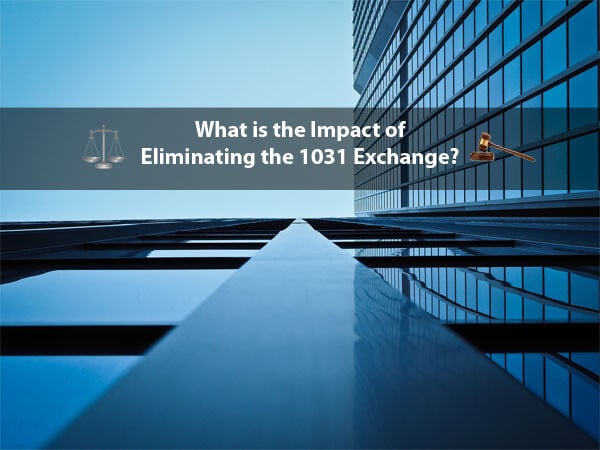As the topic of tax overhaul comes up on Capitol Hill, eliminating the 1031 exchange is another subject bound to rear its head.
What is the 1031 exchange?
The 1031 exchange makes it so a taxpayer can delay paying capital gains tax by reinvesting the proceeds from a sale. But now, this provision is receiving scrutiny. And, elimination of the 1031 exchange is a potential. If this hasn’t received your attention as an investor, it should. The proposal suggests the elimination of the 1031 Exchange where the revenues could be diverted to financing a lower corporate income tax as well as other tax cuts. “The impacts could be substantial,” says Greg Smith from IPX1031.
Where it all began
The first income code was enacted in 1918, following World War I. At the time, there were no allowances for any type of tax-deferred type of exchanges. Then, 3 years later, the Revenue Act of 1921, passed. With this, came the very first tax-deferred exchanges. The original code allowed both securities and non-like kind exchanges. The code stipulated the asset could not have a “readily realizable market value.”
As part of The Revenue Act of 1924, legislators removed the non-like-kind part of the act. Then, in 1928 the section number was changed and the code has remained largely unchanged since then.
What is the 1031 Exchange?
The 1031 Exchange takes its name from the section of the of the U.S. Internal Revenue Code (IRC) where it is codified. You may also see this referred to as the Like-Kind Exchange or Section 1031 or a Starker. In short, this concept allows for a business or investment property to be exchanged for like-kind property. Like-kind does not mean you have to exchange exactly the same type of real estate for another, just that it has to be real estate.
Commonly referred to as a “paper” gain, because the investor is not changing their economic position and therefore the event should not be taxed.
Specifically, IRC Section 1031 (a)(1) states:
“No gain or loss shall be recognized on the exchange of property held for productive use in a trade or business or for investment if such property is exchanged solely for property of like-kind which is to be held either for productive use in a trade or business or for investment.”
How do I go about a 1031 Exchange?
To engage in an exchange there are essentially a few rules to follow after you engage a Qualified Intermediary (QI). The QI holds the proceeds from the sale and then uses those same proceeds to buy another asset for you. To participate in the 1031 Exchange, you can never have possession of the proceeds. The independent 3rd party, or QI, facilitates this process. Investors must adhere to a few more rules to complete the transaction correctly.
- The real estate must be an investment property and not your personal residence.
- As mentioned before, it must simply be real estate.
- The real estate must be of equal or greater value.
- All the proceeds from the sale of the initial property must go towards the purchase of the next property or properties (to avoid all taxes).
- You have to adhere to a series of deadlines. First, identify the acquisition within 45 days. Second, the closing of the new property or properties must occur within 180 days of the sale of the first property.
The Benefits of Using 1031 Exchanges
As a direct benefit of the 1031 exchange, investors defer their capital gains. But the benefits go beyond that.
- There are no limits on the number of times you can do an exchange.
- Provides the ability to trade up into larger assets.
- Ability to diversify location and type of assets in your portfolio.
- Taxation savings reapplied to purchase more property.
- If at a later date you are in a lower tax bracket (generally in retirement), the tax burden will be less with the sale of your asset.
For nearly 100 years, businesses and investors have received the economic benefits of the 1031 Exchange.
The Risk
Elimination of the 1031 Exchange has the potential for deep impacts on our economy. Sponsored by the 1031 Like-Kind Exchange Coalition and published in March 2015 (and revised in November 2015), Ernst & Young published the Economic Impact of Repealing Like-Kind Exchange Rules detailing the impacts of a repeal. The study stated the impacts include:
- Investors and businesses subjected to a higher tax burden when they sell
- Expect businesses and investors to have longer holding periods because of lack of motivation and encouragement to exchange up
- Increased debt financing because any sales would incur taxation on their proceeds rather than being reinvested in the next like-kind asset
- Deployment of capital will slow because the number of transactions would reduce
The study produced estimates of the financial impacts of the repeal and stated,
When the revenues are used to finance a revenue neutral reduction in the corporate income tax rate, this analysis finds that the combined impact would result in a smaller economy, with less investment and lower labor incomes for workers.
- GDP is estimated to fall by $8.1 billion each year (0.04% decline in 2013 dollars) in the long-run.
- Investment is estimated to fall by $7.0 billion (0.18% decline in 2013 dollars) in the long-run.
- Labor income is estimated to fall by $1.4 billion (0.11% decline in 2013 dollars) in the long-run.
The impact is stunning. And, the desired impact of lower corporate taxes will have essentially slowed down the economy.
Not Sitting Still
Many organizations, including IPX1031, have been reaching out and sharing their concerns about the economic impact with the Treasury Department, National Economic Council as well as key legislators. Additionally, the tax-writing committee has acknowledged they have heard from other constituents. These constituents have been vocal about their concerns with the elimination of this code section. Clearly, the industry is not sitting on their hands, waiting to see what happens. Industry executives continue to stay engaged and share relevant data and facts to support the continuance of the 1031 Exchange.






